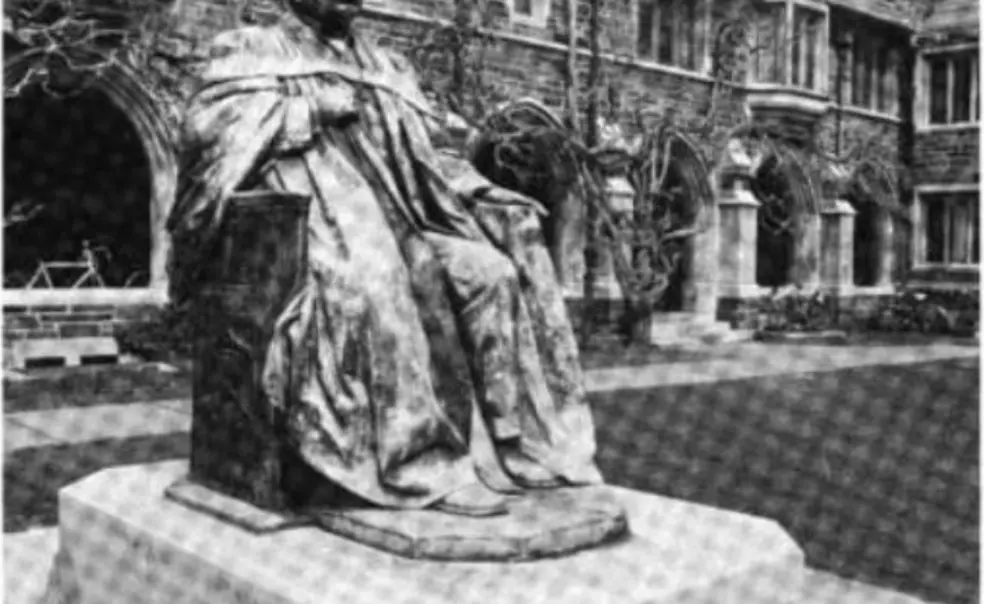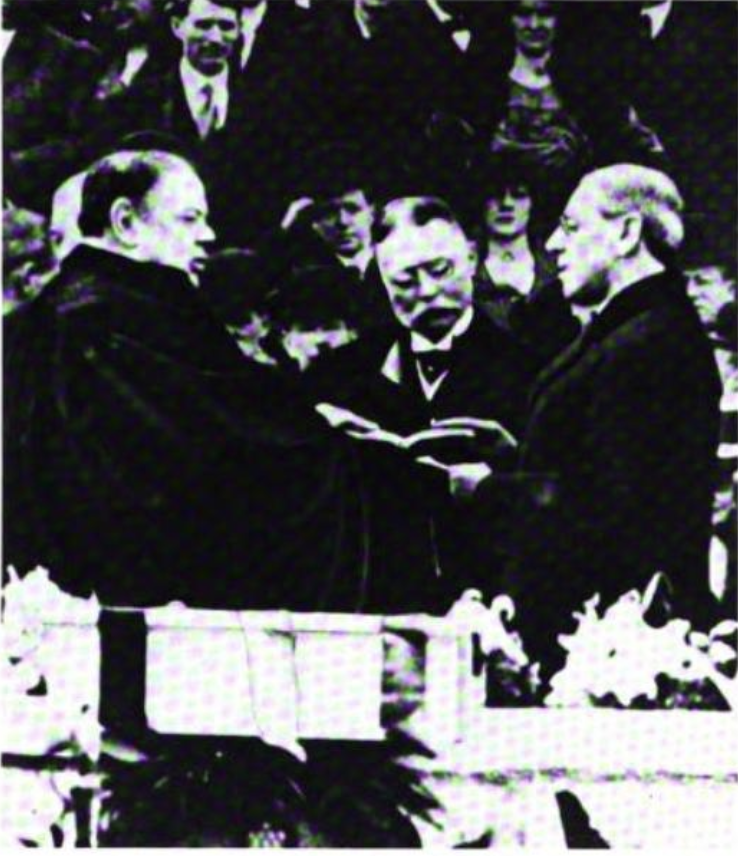Woodrow Wilson ’79: Cold Handshake, Warm Heart
Princeton's Oldest Living Alumnus Recalls Woodrow Wilson ’79
Arthur Holden ’12, a retired architect and urban planner who has been the oldest returning alumnus [as of 1991] at the last four Reunions, recently celebrated his one hundredth birthday (PAW, December 5). A resident of Washington, Connecticut, he currently serves as president and secretary of his class.
It was in 1908, while I was preparing to enter Princeton, that I learned about the trouble brewing over President Woodrow Wilson’s opposition to the eating clubs. Wilson believed that the clubs had grown too sure of themselves and too aristocratic and that they should be replaced by a system of quadrangles similar to the residential colleges for freshmen and sophomores that exist on the campus today. “Our universities must be careful,” I recall him saying, “lest the sideshow swallow up the circus.” The existence of the clubs was only one of several fractious issues that, by the middle of my junior year, would drive Wilson from what he called the “hard politics” of the university to the relatively easy politics of elective office.
As a freshman, I often heard Wilson speak in Marquand Chapel and was always impressed with the aptness of his phrases. I did not really appreciate either his charm or the depth of his mind, however, until as a student in his course on jurisprudence I encountered him in the classroom. When he discussed government, he talked about the ability of men to mold their environment. His articulateness and forcefulness as a speaker were far beyond anything I have encountered, before or since.
It happened that I was a classmate and clubmate of Randolph West ’12 *13, who was the son of Andrew Fleming West 1874, the first dean of the Graduate School and Wilson’s great adversary in the debate over the scale and location of the proposed graduate college. As a sophomore, I often had supper at the Wests’ home and became acquainted with the dean’s charm. He loved to read and discuss Latin poetry and the great culture that it represented.
I was at Dean West’s one night when the subject of the graduate college came up. To my surprise, the dean said that Wilson had deceived him. Although the remark left me momentarily speechless, I had the presence of mind to ask him, “What did he say?” After a pause, the dean replied, “He didn’t say anything, but by remaining quiet he let me assume assent.”
Years later, in the university’s library, I came across a plan for a graduate college. This document showed the college as a quadrangle, with the existing 1879 Hall forming its east side. Although West had signed it, the plan obviously reflected Wilson’s preference for a relatively small graduate college near the center of the campus, not West’s vision of a larger college off the main campus and isolated from undergraduates.
The battle over the graduate college came to a head in the spring of 1910, during the second half of my sophomore year. It split the faculty and trustees and resulted in Wilson’s resignation as president of Princeton during the fall of my junior year. But by then, he had set out on a new career, on a path that would take him first to the governor’s mansion and ultimately to the White House. Although he was an academic without experience in elective office, Wilson was successful in politics because of his great magnetism and intellect, and because he cultivated a national following through his many magazine articles and public lectures on government. George Harvey, the editor of the North American Review, and other men of influence were promoting him as the Democratic candidate for governor of New Jersey, a position they saw as a steppingstone to the Presidency.
A position on the staff of The Daily Princetonian sharpened my awareness of Wilson’s nascent political career. My friend David Lawrence ’10, who later founded U.S. News & World Report, was working his way through college as a reporter for the Associated Press. The Princetonian had recently been granted membership in the A.P. – the first college daily so honored – and Dave, after filing his nightly dispatches, would stay around the office and exchange opinions with me and other members of the editorial staff. Dave had a better sense of Wilson’s growing political support than we did, and the prospect of his becoming President excited us all. In our idealistic minds, we believed that Wilson would infuse the Democratic Party with a kind of scholarly liberalism.
In October 1910, during the fall of my junior year, I had occasion to call on Wilson at his office, in the tower of 1879 Hall. He had accepted the Democratic nomination for governor a month earlier and was now in the thick of the campaign, all the while still carrying out his duties as president of the university. He was scheduled to deliver an important policy speech in Trenton that evening, and like any good reporter, I hoped to learn in advance what he planned to say. I first approached his secretary, a certain Mr. Close, requesting an interview with Wilson and stating my purposes for it. Close put me on the president’s calendar but said he knew nothing about the speech, because Wilson prepared his own drafts and did his own typing.When I returned a little later in the day for the appointment, Wilson greeted me with his usual charm. He said that because he had only one copy of the speech, he could not turn it over to me, as I had requested. As a student who had sworn to respect the Honor Code, I begged that I be allowed to take the singly copy back to my room and make an abstract of it. After a few remarks about what he proposed to say that night, Wilson permitted me to do this, provided that I returned with the typescript by two o’clock. I remember to this day taking his proffered hand and feeling (in contrast to his personal warmth) how cold it was. I will never forget that goodbye handshake of Wilson, who a month later would be swept into office in a landslide victory.
During our brief interview, the impression that Wilson conveyed was one of absolute sincerity. As I recall my association with Dean West, I believe that he was no less sincere in his convictions. But neither man, in my opinion, possessed the innate sense of humor that enables an individual to view himself as others see him.
This was originally published in the January 23, 1991 issue of PAW.













No responses yet